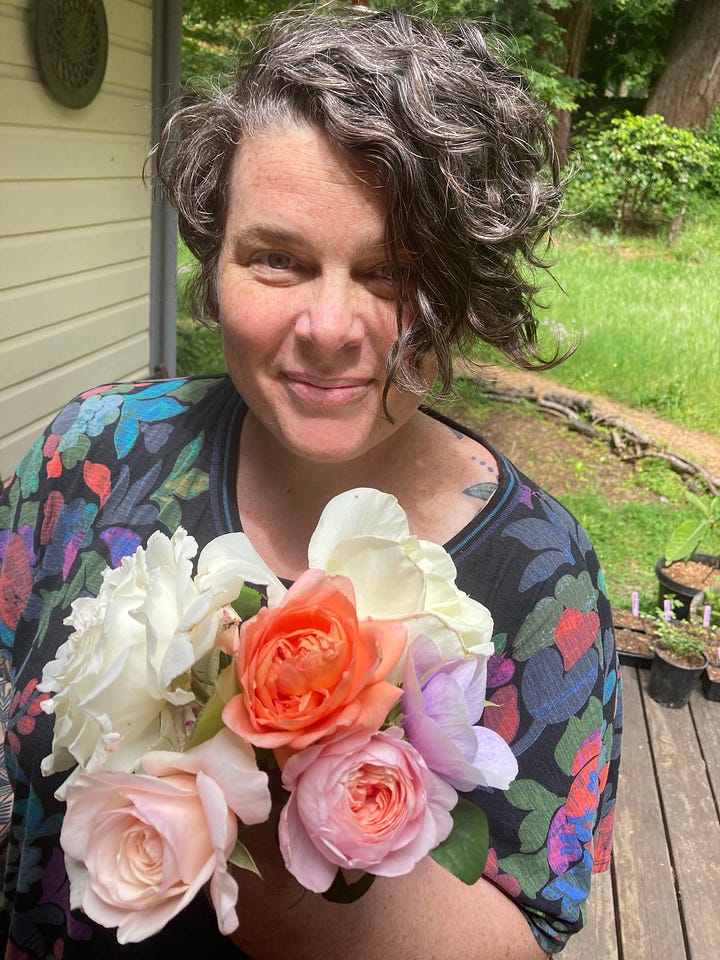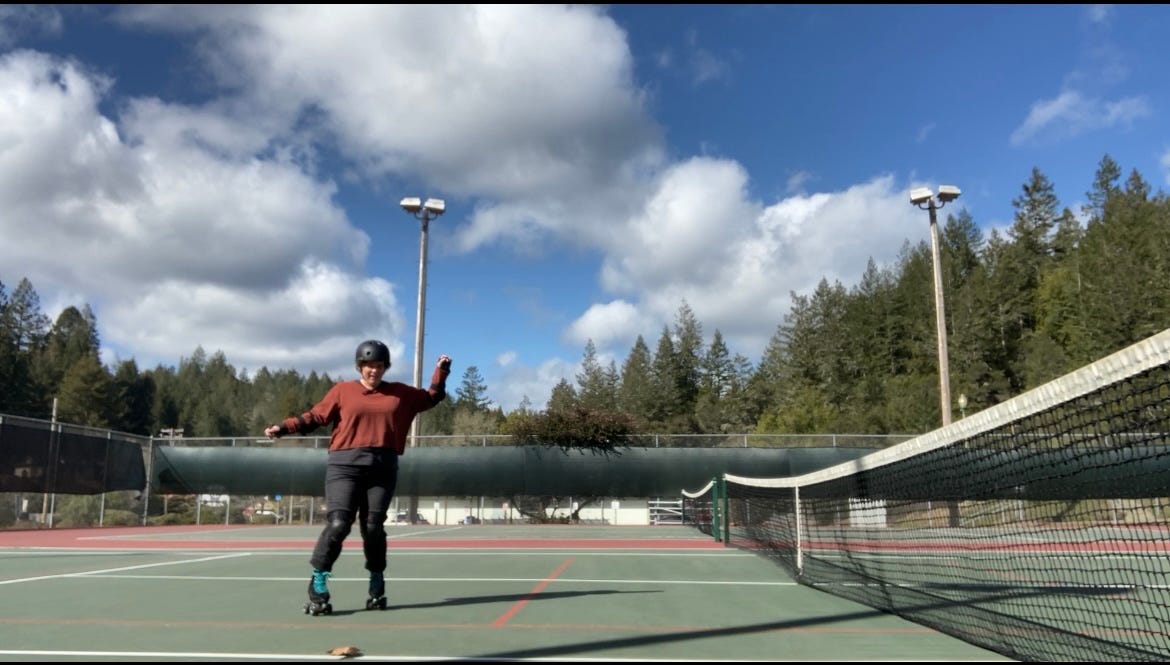Hello friends,
I’m pleased to share another installment of the occasional series I do, in which I invite an author to tell us five things—not only about their most recent book, but about their life too.
I met Manjula Martin in 2014, when she came to my house to interview me for her wonderful (and now defunct) digital magazine, Scratch, which she described as being about “the relationship between writing and money, art and commerce, life and work.” After a bit of introductory chit chat, we sat in my living room and had a long, frank, far-ranging talk about money—one of the most taboo subjects of all. After her magazine folded, Manjula collected several pieces from it—including our interview—in an excellent anthology that I’ve recommended many times to people who want to know more about how writers make a living.
As I read Manjula’s new book, The Last Fire Season, I admired all over again the qualities I observed in her in our first meeting. Her kindness and candor. Her curiosity and intellectual courage. Her willingness to explore and contemplate the layers of things rather than reaching for easy judgment. The Last Fire Season is a memoir of five months in 2020, when Manjula and her partner, Max, had to evacuate from their home in Sonoma County due to wildfires. And in true Manjula Martin explore-and-contemplate-the-layers-of-things style, it’s also a book about so much more: climate change, chronic pain, collective grief, the meaning of gardening, and the natural history of California. It’s a book rich with insight.
I’m so pleased to share her words with you here today. Happy pub day, Manjula!
xCheryl
Tell us about a time when you took advice that turned out to be really good or really bad.
There is an old gem that my dad, who is a gardening teacher, likes to tell when he’s talking about how to grow fruit trees. He pulls out this kernel of advice—part joke, part axiom—at every workshop he teaches, for every intern he trains, at every opportunity he gets. It’s in the book we wrote together. It goes like this:
Q: When is the best time to plant a fruit tree?
A: Five years ago.
Today I was out in my garden looking at the apple trees. At this time of year the sun barely makes it over the tops of the redwood trees surrounding my house, and the garden is moist with dew all day long. As clouds rolled in from the coast, signifying a coming rainstorm, I strolled through the little orchard. Six dwarf apple trees, a couple of plums. They started their residence in my yard as tiny, twiglike bare-root saplings, and only this year did they begin to resemble the image I have in my mind of the thing called “apple tree.” By the winter solstice, the trees shed their leaves and assume a more austere profile. As I observed their forms I was thinking about the progress of the trees over their lifetime; this year was the first time they bore fruit. I planted them five years ago. Turns out he was right.
Tell us about your book, The Last Fire Season: A Personal and Pyronatural History.
It’s a memoir that combines personal experience with reporting and cultural criticism to examine the wildfire crisis in the American West—which is in many ways a direct result of both climate change and colonialism (which are themselves interlinked!). The story follows the epic fire season of 2020 in Northern California, where there were multiple devastating fires near my home in Sonoma County and also in the place where I grew up, Santa Cruz. That season wasn’t the first time I’d experienced fires, but it was when I realized wildfire was no longer an occasional, seasonal event—I’d be living with it for the rest of my life.
Interwoven into the fire story is a simultaneous narrative about my body and my garden. At the same moment I moved to the woods, my IUD malfunctioned and attacked my body, leading to a hysterectomy and chronic pelvic pain. While trying to recover, I planted a flower garden, which forged a new kind of link between my body and the land on which I live. This confluence of events and crises—all in some way related to larger, systemic crises—encouraged me to reconsider my understanding of what we call “nature,” and my place within it.
I wrote The Last Fire Season because I was looking for a way forward within polycrisis, and I was frustrated with narratives and punditry that seemed to frame every issue as a strict binary: fire is bad or good, a body is well or unwell, nature is pure or ravaged, a person has hope vs. despair about the climate. I want to find new ways of telling stories about natural bodies—a planet, a grove of burned trees, one specific human body. I don’t think that humans can really move forward into whatever’s coming for us next without facing what we’ve done to our home and each other. Such a reckoning includes the beauty, joy, and community found in crisis, as well as the pain. The sociologist Donna Haraway calls this “staying with the trouble.”
That, and I really fucking love trees.
Tell us about a personal transformation in your life or a change that you’ve made for the better.
I am not even sure how it happened, I must have seen someone doing it, but one day, about a year ago, I randomly decided I was going to take up roller skating. I’m in my late forties, and I haven’t skated since I was about twelve.
I started looking at skates online and my partner said, maybe you should try actually skating before you buy roller skates, so one cold winter morning I went alone to the nearest roller rink and oh my god, let me tell you how awesome roller skating is. It is excellent exercise, great for the pelvic floor, but more importantly it’s pure joy. And for me—a creative professional, a perfectionist—it feels radically anti-productive to invest myself in an activity that, let's be honest, I'll never be very good at.
Lately I have been learning how to skate backward, a destabilizing activity that engages unfamiliar methods of muscle and mind coordination. When I skate backward, I am forced to think about my environment in new ways. Going against the flow, in circles, I realize that the world exists in multiple dimensions. I’m a somewhat anxious person, and when I skate backward I can look forward all I want to, but I also have to keep one eye behind me…which is actually ahead of me. (Yeah, it's a trip.) I guess sometimes the only way to reckon with the unknown future is to roll backwards, very very slowly, until the music stops or you fall on your ass.
Tell us about a regret you have or a mistake you’ve made.
Despite my love of going backwards, I’m not sure I believe in regrets. Was it a mistake to smoke all those cigarettes when I was in my twenties? Sure, probably. It was also probably a mistake not to regularly moisturize my neck and hands until I was in my forties. But whatever! It’s fine!
I do sometimes think about other potential paths my life might have taken. For example, in high school I interned in a costume shop at a professional theater company. In some other timeline, might I now be designing costumes on Broadway? What if I’d stayed working in journalism in New York in the 90s, instead of quitting to work in a nightclub and then burning out and moving back West? If I’d hooked up with my office crush at that desk job back in ’06, would I still be in the city? Would I be divorced? There are so many ones that got away, and from time to time I take pleasure—and okay, maybe a little regret—in imagining them.


Tell us your best advice.
Is now a good time to confess that I sort of hate the basic concept of advice-giving? I don’t know why. Something about prescriptiveness that I recoil from, often to my own detriment, probably.
That said, once, on a beachy island, down a potholed road, I saw a sign that was painted on an old surfboard. It said, “Try slow.” I can’t think of better advice, although I don't always follow it myself. Try slow.
And here’s some slightly more pragmatic advice: if you’re a woman or femme identified person, and you’re in a situation where someone asks how much pain you’re feeling on a scale of 1-10, always inflate your number by one or two. You’re tough, yeah, but also you’re a woman, and within the systems that are supposed to care for you, your comfort is valued less than men’s. You shouldn’t have to be that tough. The right amount of pain to have is zero. So, round up.
Try slow, and round up.
Manjula Martin is author of The Last Fire Season: A Personal and Pyronatural History. She is coauthor of Fruit Trees for Every Garden, which won the 2020 American Horticultural Society Book Award. Martin edited the anthology Scratch: Writers, Money, and the Art of Making a Living, and she was managing editor of the National Magazine Award–winning literary journal Zoetrope: All-Story. She lives in California.







"Try slow." I love that. Also...the bit about rounding up on a pain scale. I always want to ask, "Is 10 the pain of having a baby?" Because if it is, my number would be lower...but men don't have babies, so is this magical 10 number a complete fallacy and how do we describe our pain at all? I do always go up a couple notches as well. Do I think it's a 3 if 10 is delivering a baby? In that case, I'd be at least a 7 if I were a man...right?
When I saw this in my Inbox today, my first thought was: I don’t have time to read this. Then I thought: What is my time for? For simply thinking about how little of it I have? So I opened up and read. I am so glad I did! “Five years ago.”! That made me laugh out loud. And “Try slow.” A great reminder! Thank you Cheryl & Manjula for taking the time to share this with us all.